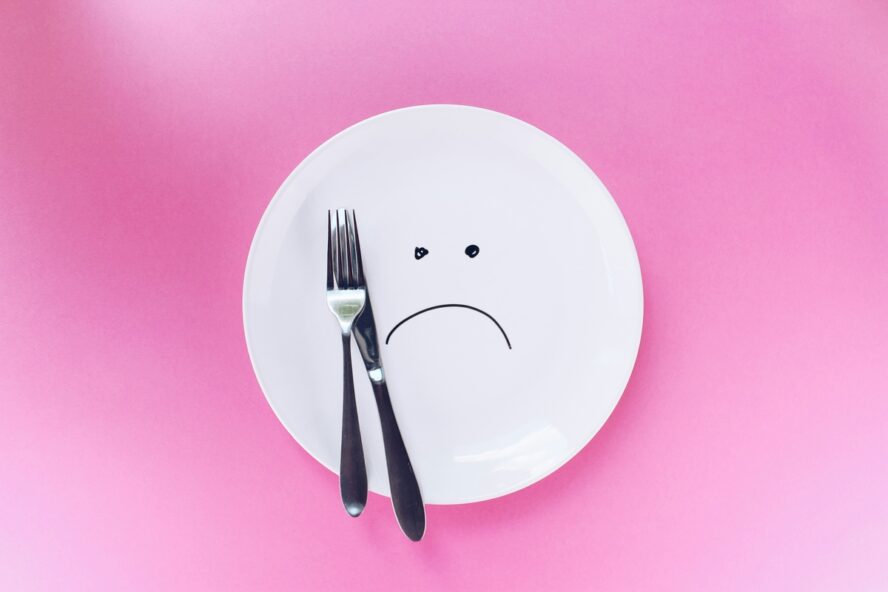Why Intermittent Fasting for Women Isn’t as Great as We Thought
Intermittent fasting isn’t for everyone, and women especially should think twice before jumping in.

At first glance, intermittent fasting sounds like the perfect solution to all of your health concerns, with studies linking the practice to weight loss, anti-inflammatory benefits1, reduced blood pressure, reduced risk of liver disease2, improved gut health3, and more. But it turns out intermittent fasting benefits aren’t necessarily a given — particularly for women, who may see negative repercussions on hormone health, mood, and even lifespan.
“Contrary to what some longevity gurus say, intermittent fasting (IF) isn’t automatically protection, and in some cases may be harmful,” explains Kim Shapira, registered dietitian and author of This is What You’re Really Hungry For.
It’s time to set the record straight: the good, the bad, and the ugly. Ultimately, is intermittent fasting good for you? And is intermittent fasting healthy for women? Here’s what you need to bear in mind as a woman considering an intermittent fasting protocol.
Why Are We Just Now Realizing the Potential Risks of Intermittent Fasting?
If it took us this long to figure out the potentially detrimental effects of intermittent fasting on women, it’s in large part due to making some dangerous assumptions. The first round of studies on the practice were done chiefly on men, and we simply can’t draw clear conclusions about the practice for women based on that data.

If more than half the population slipped through the cracks, it isn’t really all that surprising, according to Kathleen Garcia-Benson, a registered dietitian specializing in PCOS and Women’s Health. She cites “a long-standing pattern in medical research where men were treated as the ‘default,’ and women’s health was considered too complex or inconvenient to study.”
“This created a gap in data that still shapes what we know today and reflects both systemic barriers in research priorities,” she continues.
The Potential Negative Effects of Intermittent Fasting
So before you dive into any intermittent fasting routine, what are the key risks women should keep in mind? If you already struggle with any of the below aspects of your health, you may want to think twice before jumping into IF.
Disrupted Hormone Health
While intermittent fasting can have positive effects on hormone health in both men and women, the complexity of the female endocrine system means that it’s far from a one-size-fits-all solution. A 2022 research review in Nutrients highlighted both benefits and potential risks4. While fasting can help treat hyperandrogenism in females with polycystic ovarian syndrome (PCOS), it can also increase estradiol and decrease luteinizing hormone, leading to negative changes in the menstrual cycle.
“What we have so far shows mixed results,” explains Garcia-Benson. “In some women with PCOS, it may lower androgens and help balance hormones, but for others, especially if calories are too low or activity is high, it can throw off cycles and energy.”
For Shapira, the evidence is strong enough to lead her to deter most women from participating in the practice. “IF can and will disrupt women’s hormones, raising stress (cortisol), impacting sleep and throwing off our metabolism,” she says. “These shifts will impact their menstrual cycle, sleep, mood, weight, hydration, bone health, muscle mass and metabolism.”
Garcia-Benson, however, is a bit more moderate in her approach. “The safest approach is to monitor things like menstrual health, energy, and thyroid symptoms,” she says, “and stop if problems show up.”
Mood Instability

Another issue potentially linked to IF protocols and hormone health is mood instability. This may be a short-term problem linked to temporary hunger, or a longer-term issue also stemming from hormonal disruption.
“You will see dips in energy, irritability, hypoglycemia – especially in women who are already sensitive to blood sugar swings,” says Shapira, who notes that fasting has the potential to “increase irritability, anxiety and make it harder to fall asleep or stay asleep, which then will further affect our hormones and metabolism.”
This, according to Alisa Vitti, Integrative Nutritionist, Author, & Founder of FLO Living, is in large part due to the interlinked nature of the various hormones in the endocrine system. “A disruption in one hormone system in the body can trigger other hormone imbalances,” she says, citing thyroid hormones and stress hormone cortisol as two potentially linked systems whose disruptions can have negative side effects on both physical and emotional well-being.
Estrogen imbalance has been linked to low energy and impaired cognitive function5, while cortisol imbalance can be linked to anxiety and insomnia, and thyroid hormone imbalances could lead to brain fog and depression. In some women, intermittent fasting can cause or exacerbate all of these problems.
Exacerbation of Eating Disorders
While eating disorders are not linked to biological sex, people identifying as women are more likely to suffer from an eating disorder than people identifying as men6. And according to a 2023 research review in Clinical Diabetes and Endocrinology, intermittent fasting can exacerbate these underlying issues7.

“Intermittent fasting, depending on how it’s implemented, can greatly decrease the time window and amount of total calories a person eats in a day,” explains Jordan Hill, MCD, RD, CSSD at Live it Up. “Time-bound eating rules and food restriction can lead to extreme hunger and cravings, which can lead to bingeing or other disordered eating behaviors. This can be especially true for individuals that have a history of dieting, disordered eating, or body image challenges.”
For Shapira, she sees IF as a form of waiting for “permission from a clock” rather than listening to your body’s hunger cues. “This will create a disconnect from your natural signals, and can spiral into cycles of overeating, guilt and shame,” she says. “For someone already vulnerable, it can worsen an existing eating disorder or trigger one that has been dormant.”
Nutrient Deficiencies
Intermittent fasting also has the potential to pave the way for nutrient deficiencies. Garcia-Benson notes this is not directly linked to eating within time windows, but rather something that stems from the resulting potential for caloric restriction.
“Intermittent fasting can create problems if it leads to low calorie intake,” she says. This, she says, can affect not just hormones, but also the menstrual cycle and even performance and recovery in active women. “Very narrow eating windows can make it harder to meet nutrient needs such as protein, iron, fiber, calcium, etc.”
A Shortened Lifespan
Following a study from Mass General Brigham exploring meal timing in older adults, a recent article from Harvard posited a link between intermittent fasting and a shorter lifespan8.
“Later meal timing, especially delayed breakfast, is tied to both health challenges and increased mortality risk in older adults,” explained lead author Hassan Dashti, a nutrition scientist and circadian biologist at Harvard-affiliated Massachusetts General Hospital. “These results add new meaning to the saying that ‘breakfast is the most important meal of the day,’ especially for older individuals.”
But Hill is quick to caution against drawing a relationship of causality. “The article discusses older adults and their later breakfast times potentially being a marker of frailty, depression, sleep problems, or social and functional decline versus simply being an eating pattern of intermittent fasting,” she explains.
Garcia-Benson agrees. “People who skip breakfast or eat in very narrow windows often have other issues going on like low appetite, depression, or poor access to food,” explains Garcia-Benson. “That can make fasting look linked to higher mortality, even if it’s not the fasting itself. What does stand out is that eating earlier in the day and not overly restricting the eating window seems to be more supportive for long-term health.”
Is Intermittent Fasting Right for You?
Ultimately, like any eating protocol, intermittent fasting isn’t for everyone. The answer to whether intermittent fasting is bad (or good!) for you will really depend on you. It’s essential to listen to your own body to see if the practice is helping or harming your health — and to speak to a healthcare professional before making any big changes to diet or lifestyle.
Read More on Organic Authority
Sources:
- https://pmc.ncbi.nlm.nih.gov/articles/PMC9946909/
- https://www.bmj.com/content/389/bmj-2024-082007
- https://cyprusjmedsci.com/articles/intermittent-fasting-and-its-potential-effects-on-health/doi/cjms.2024.2023-109
- https://pmc.ncbi.nlm.nih.gov/articles/PMC9182756/
- https://pmc.ncbi.nlm.nih.gov/articles/PMC3660717/
- https://pmc.ncbi.nlm.nih.gov/articles/PMC2696560/
- https://pmc.ncbi.nlm.nih.gov/articles/PMC10589984/
- https://news.harvard.edu/gazette/story/2025/09/early-breakfast-could-help-you-live-longer/

